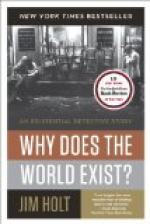|
This section contains 462 words (approx. 2 pages at 400 words per page) |

|
Interlude, The Arithmetic of Nothingness, Chapter 3, A Brief History of Nothing Summary and Analysis
Mathematics, Holt believes, came from nothing, that is the concept of "zero." The Greeks and Romans found the idea ridiculous, but Indians found it sensible given Buddhist philosophy. The transition from "0" to "1" in contemporary systems where the question makes sense, is vexed. Leibniz invented calculus to deal with it, by dealing with the infinite series it made possible. Modern mathematicians have raised the question of whether "0" understood as an empty set can be said to exist. That is, is there such a thing as nothing? If so, perhaps nothing can generate something. Where did a robust "Nothing" of this sort come from?
To answer this question, Holt argues in Chapter 2 that we must give a history of nothing. For much of...
|
This section contains 462 words (approx. 2 pages at 400 words per page) |

|




